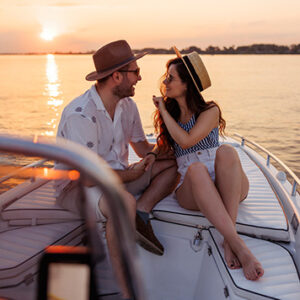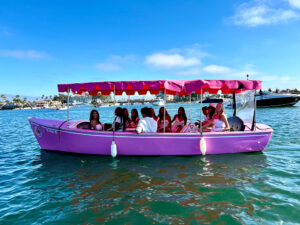Introduction
Boating is one of the most enjoyable ways to spend a day outdoors, whether you’re cruising, fishing, or exploring. However, with so many boats sharing the water, it’s essential to practice proper boating etiquette. Courteous behavior not only ensures a safe and enjoyable experience for you and your guests, but also promotes harmony and respect among other boaters. Understanding and adhering to boating etiquette helps to keep the waterways safe, organized, and enjoyable for all.
This article covers essential boating etiquette tips that will help you navigate the waters responsibly and courteously. From docking and navigating to being mindful of noise, we’ll guide you through the key practices that every boater should follow. By the end of this guide, you’ll be well-prepared to make your next boating trip both fun and respectful.
Let’s dive into the rules of boating etiquette and ensure that you’re contributing to a pleasant experience for everyone on the water.
Respect Right of Way Rules
Just like on the road, boats have right-of-way rules that need to be followed to prevent accidents and confusion. A basic rule of thumb is that sailboats and smaller, non-motorized vessels such as kayaks and canoes usually have the right of way over powered boats. When two powerboats are on a head-on course, both should steer to their right (starboard) to avoid a collision.
When overtaking another boat, the vessel being overtaken has the right of way. It’s your responsibility to pass on the safest side and give the other boat plenty of space. Always maintain a proper lookout, and avoid making sudden, unpredictable changes in course.
Respecting the right of way is a fundamental aspect of boating etiquette that ensures safety for all water users. Understanding and following these rules helps prevent accidents and keeps the waterways running smoothly.
Observe No-Wake Zones
No-wake zones are designated areas where boats must operate at a slow speed to minimize the wake (waves) they create. These zones are often found near marinas, docks, or areas with heavy boat traffic and are crucial for reducing the risk of damage to boats, shorelines, and wildlife. Additionally, excessive wakes can create safety hazards for smaller boats and swimmers.
Always pay attention to posted signs indicating no-wake zones, and be sure to slow down accordingly. Failing to respect no-wake zones is not only unsafe but can also result in fines or penalties. It’s important to understand that the wake your boat creates can affect others, even at a distance, so practice courtesy by adjusting your speed when necessary.
By observing no-wake zones, you’ll help protect the environment, other boaters, and yourself from potential hazards.
Keep a Safe Distance from Other Boats
Boating involves sharing open water with many others, so maintaining a safe distance from other boats is essential. Crowding another boat can make it difficult for both vessels to navigate safely and can cause anxiety for inexperienced boaters. A good rule of thumb is to stay at least 100 feet away from other boats, especially in areas with lots of traffic.
If you’re passing another boat, do so at a safe speed and distance to avoid causing large wakes that could rock the other vessel. When you’re anchoring or stopping to fish, make sure you give others plenty of space to enjoy their activities without feeling crowded.
Maintaining a safe distance shows respect for other boaters and ensures that everyone has enough space to enjoy their time on the water without feeling pressured or unsafe.
Be Mindful of Noise Levels
One of the joys of boating is the peace and tranquility of being on the water. However, excessive noise can quickly ruin that experience for others. While it’s tempting to blast music or rev your engine, it’s important to be considerate of those around you, especially in quieter, more serene environments like coves, nature reserves, or no-wake zones.
If you enjoy listening to music on the water, keep the volume at a reasonable level, particularly when passing other boats or near shorelines where people may be relaxing or fishing. Likewise, avoid shouting or loud conversations, especially in crowded areas where voices can carry easily across the water.
Being mindful of noise helps maintain the relaxing atmosphere of the water for everyone and contributes to a more enjoyable experience for all boaters.
Practice Good Docking Etiquette
Docking can be one of the most challenging aspects of boating, especially in crowded areas. However, practicing good docking etiquette can make the process smoother for everyone involved. Always approach the dock slowly and cautiously, keeping an eye on other boats and people nearby. Avoid blocking the dock for too long, especially in busy marinas where others may be waiting to dock or launch their boats.
If you’re waiting for a spot, be patient and give the other boaters space to maneuver. When you’re tying up at a public dock, make sure you leave enough room for other boats and don’t stay longer than necessary if space is limited.
Polite and patient docking behavior ensures that everyone has a fair chance to dock their boat safely and efficiently. It also prevents unnecessary delays and potential accidents in high-traffic areas.
Be Prepared to Assist Other Boaters
Boating is a community activity, and it’s important to help out fellow boaters when needed. Whether it’s assisting someone in distress, offering help with docking, or simply providing directions, being courteous and ready to lend a hand creates a safer and more cooperative environment on the water.
If you see a boat in trouble, don’t hesitate to offer assistance, whether it’s towing them back to shore or offering basic repairs if you’re able. Additionally, be aware of distress signals, such as a boat flying a flag or flashing lights, indicating that they need help.
Helping other boaters not only contributes to a sense of camaraderie on the water but also ensures that everyone can enjoy their time safely and without unnecessary stress.
Respect the Environment
Boating offers a unique opportunity to enjoy the beauty of nature, but with that comes the responsibility to protect the environment. Always be mindful of your impact on the waterways, shorelines, and wildlife. Avoid littering or dumping anything overboard, and be sure to dispose of trash properly when you return to shore.
If you’re anchoring in a natural area, take care not to damage delicate ecosystems like coral reefs or underwater vegetation. Many boating destinations are home to sensitive wildlife, so it’s important to avoid disturbing their habitats. Be especially mindful of speed limits and no-wake zones near wildlife sanctuaries or breeding grounds.
Practicing eco-friendly boating habits ensures that future generations can enjoy these beautiful waterways while preserving the natural habitats of marine life.
Anchor Responsibly
When it’s time to anchor for a break, swim, or fish, ensure that you anchor responsibly. Choose a location that is safe and doesn’t obstruct the paths of other boats. Avoid anchoring too close to other vessels, and always give other boaters enough space to move freely and safely. Be aware of anchorage rules in certain areas, as some regions may have restrictions to protect wildlife or underwater habitats.
When anchoring, double-check that your anchor is properly set to avoid drifting into other boats or areas where you could cause damage. Monitor the weather and tide changes, as these can affect your anchoring position over time.
Anchoring responsibly not only prevents accidents but also ensures that you and other boaters can enjoy the water without interruptions or hazards.
Clean Up After Yourself
A courteous boater always leaves the water and boat as clean as they found it. Be sure to clean up any trash or debris left on board, and don’t leave any litter behind in the water. Bring along a trash bag or container to keep your boat tidy, and properly dispose of all garbage when you return to shore.
Many boaters enjoy picnicking, fishing, or enjoying beverages while on the water, but it’s essential to ensure that none of this waste ends up polluting the environment. It’s also important to clean your boat regularly, as accumulated waste or food remnants can attract wildlife or even damage the boat.
By cleaning up after yourself, you help maintain the beauty of the waterways and ensure a cleaner environment for everyone to enjoy.
Conclusion
Boating is a wonderful way to enjoy the outdoors, but it requires a commitment to courtesy, safety, and respect for others and the environment. By practicing good boating etiquette—respecting right-of-way rules, observing no-wake zones, keeping noise levels down, and cleaning up after yourself—you contribute to a better, more enjoyable experience for everyone on the water.
Whether you’re an experienced boater or just starting out, following these simple yet important etiquette guidelines will help you have a smooth, safe, and courteous day on the water. Not only will it enhance your experience, but it will also help create a positive atmosphere for all boaters to enjoy.
So the next time you head out on the water, remember these tips and make your boating day as courteous as it is fun!
Excited for an adventure with us or have a question? Call us at: (949) 675-8433 Book Your Ride with us: Click here to Book





